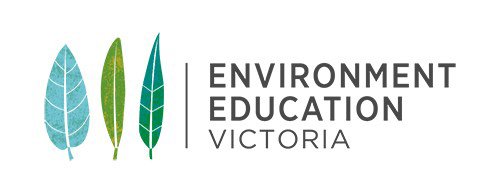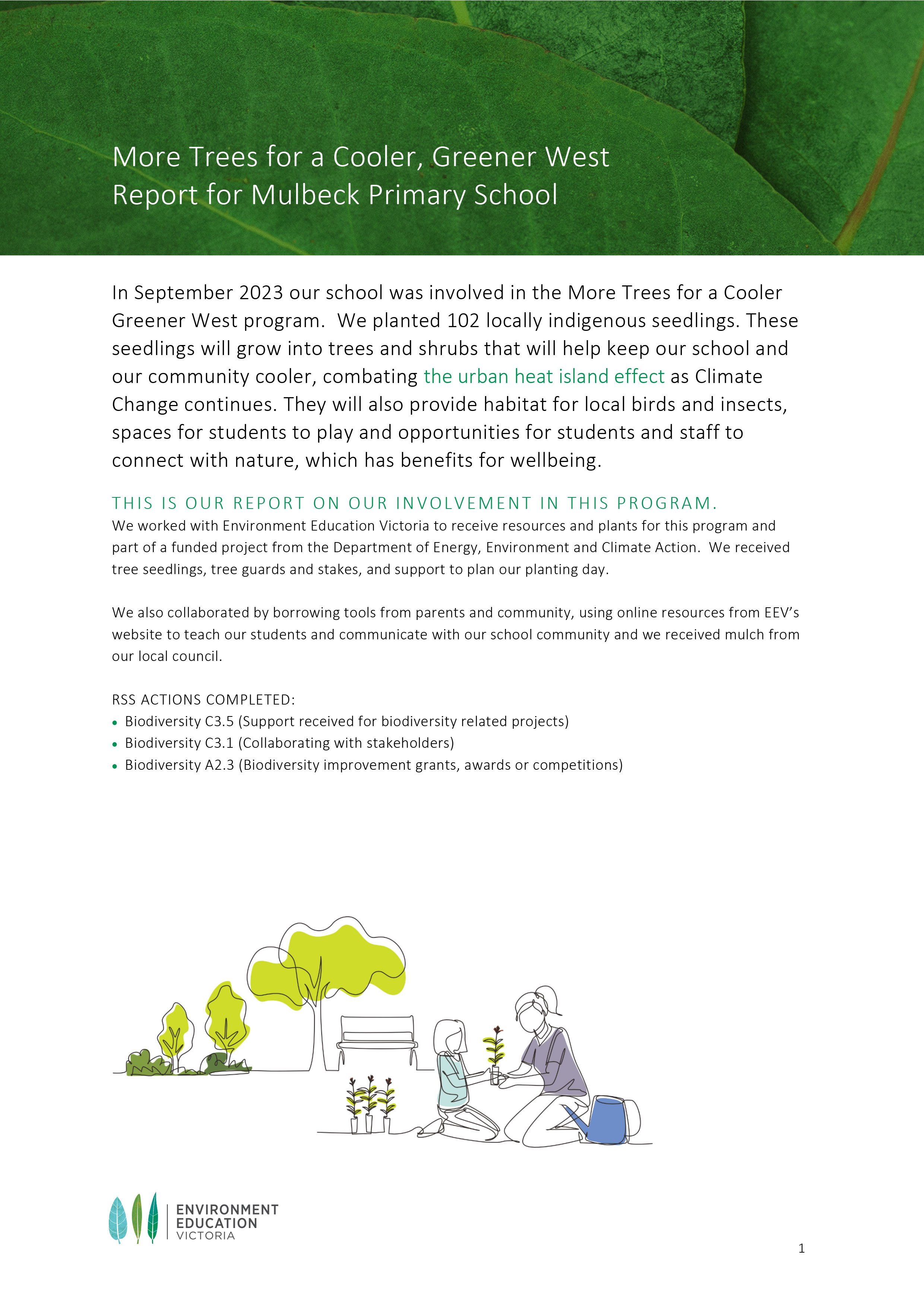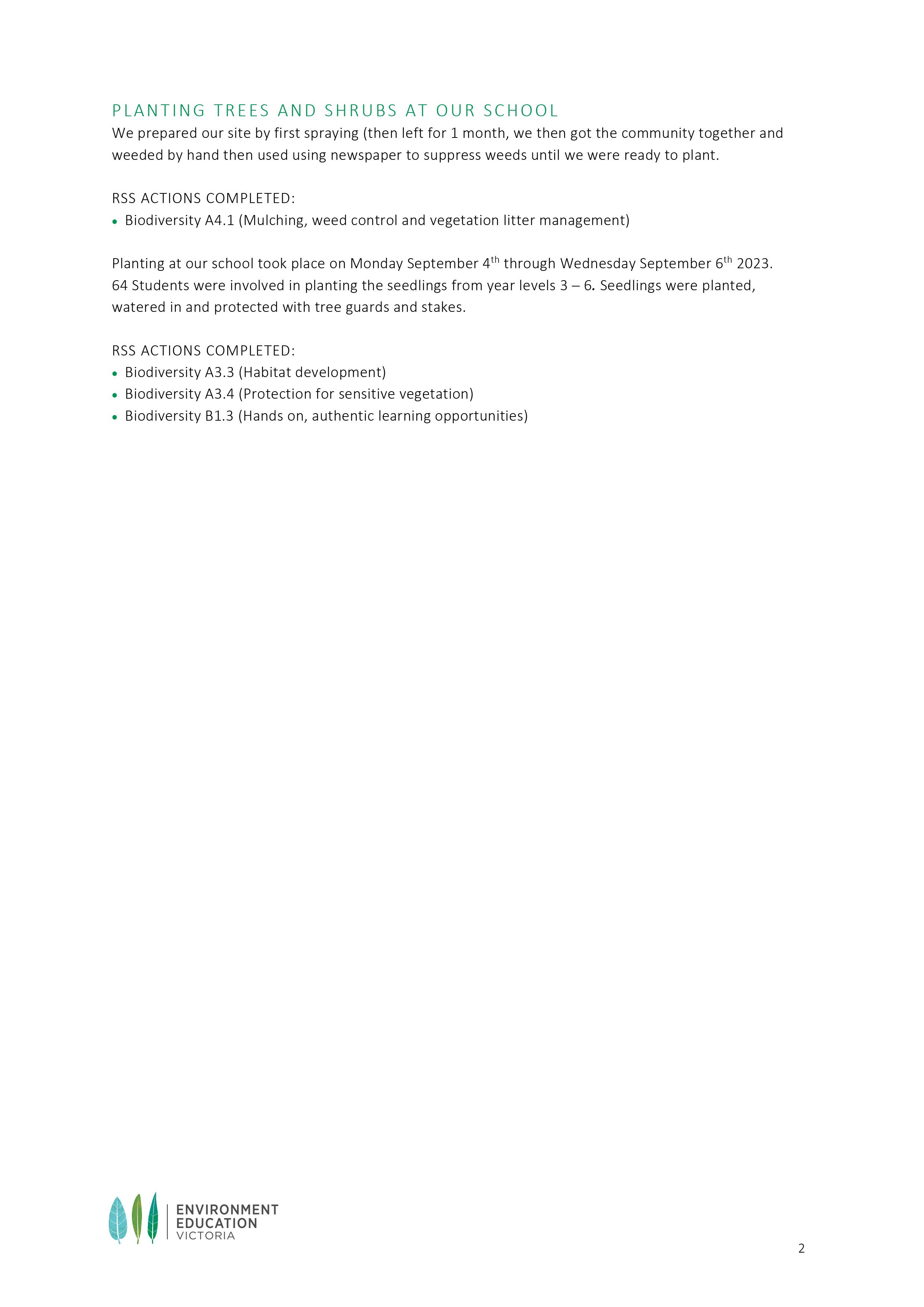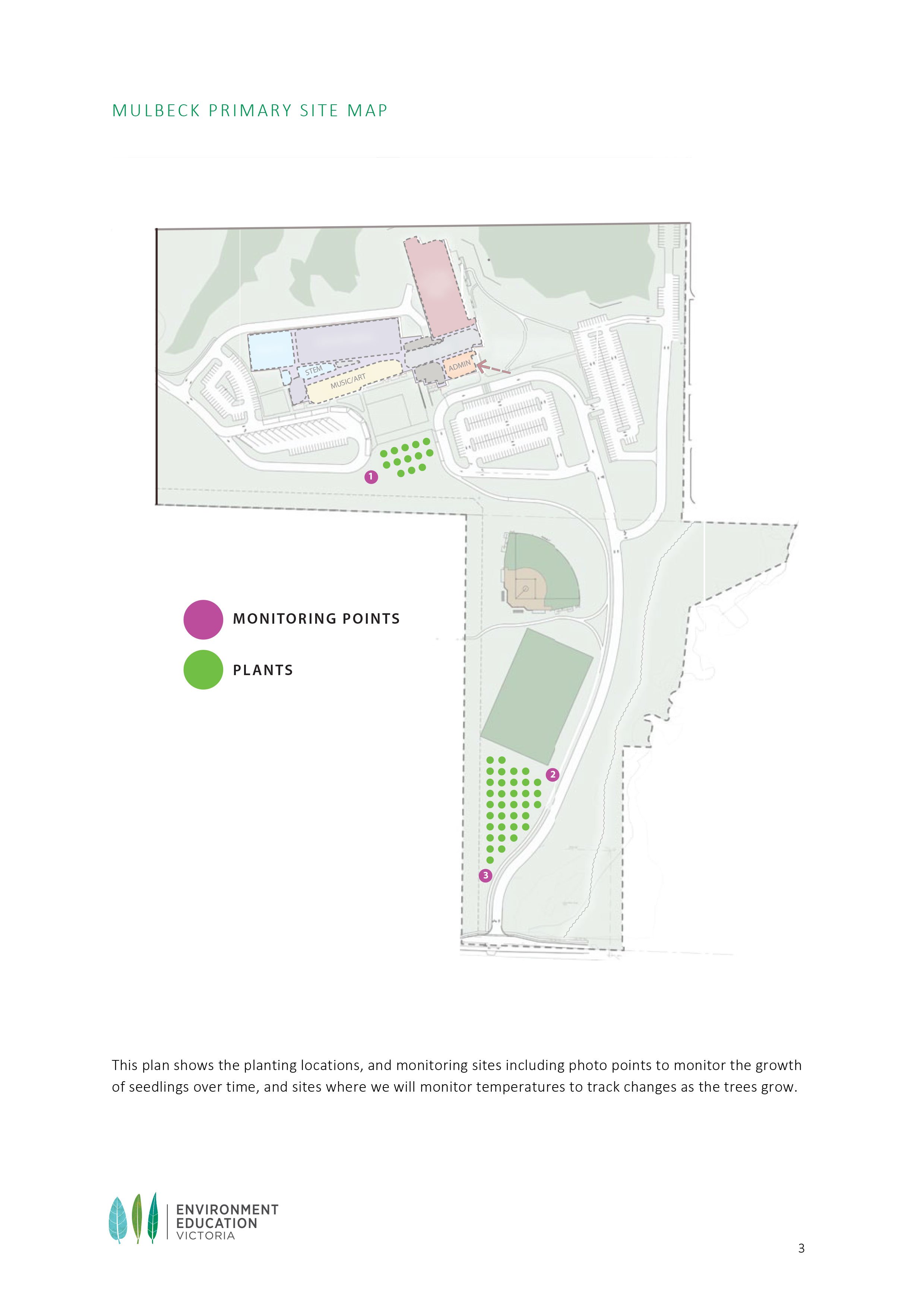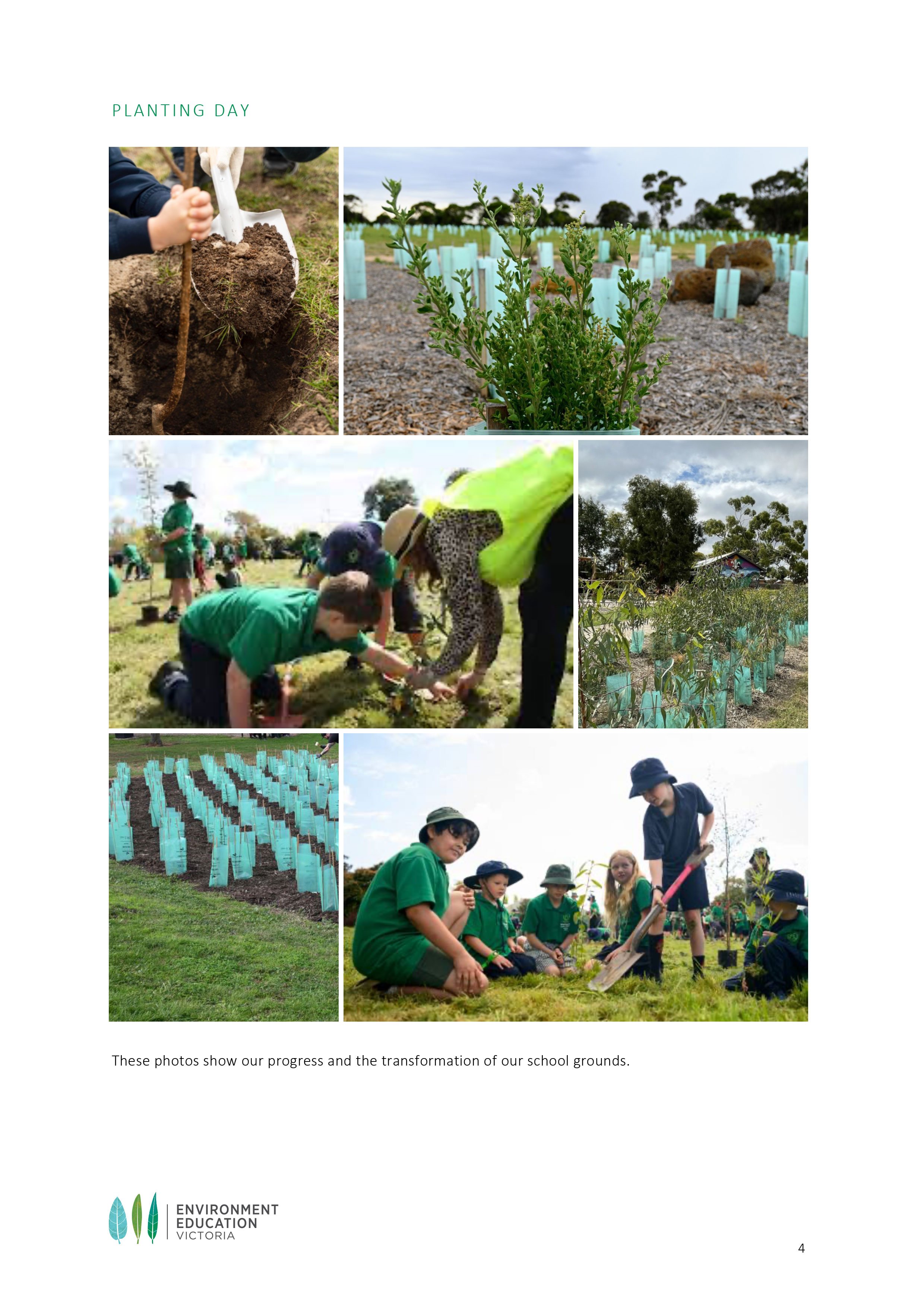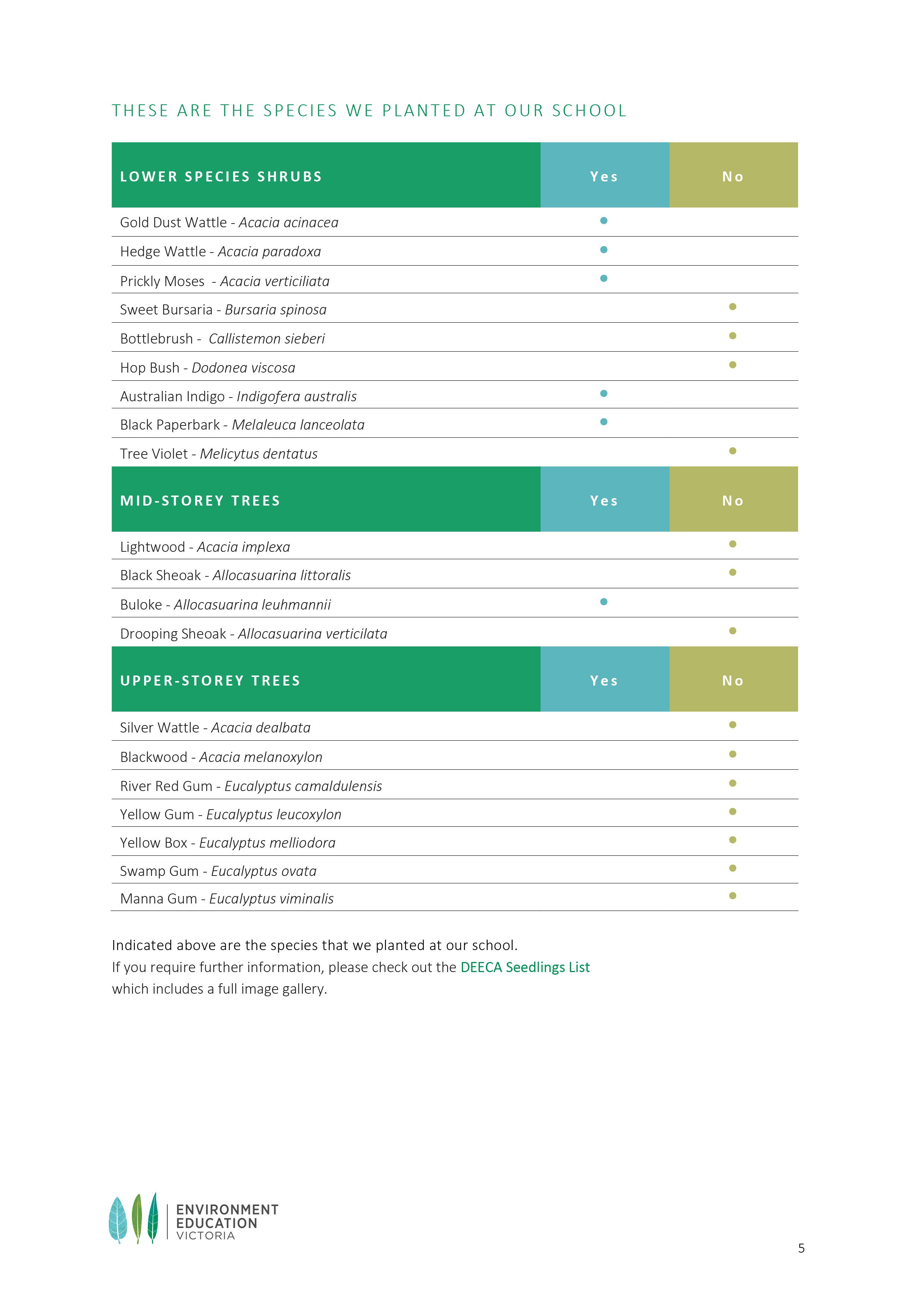More Trees for a Cooler Greener West:
Reporting Requirements
SCHOOLS HAVE THREE (3) TASKS TO COMPLETE BEFORE 15th December 2023
1. Complete the online DEECA survey.
2. Complete a brief Project Report and submit it to EEV. EEV will forward the report to DEECA on the school’s behalf.
3. Upload the completed Project Report to the ResourceSmart Schools online portal.
1.complete online DEECA SURVEY
Here is a link to the online DEECA survey.
It’s very short and very easy to complete.
Please complete the survey by Friday 15th December, 2023.
2. COMPLETE A BRIEF PROJECT REPORT AND RETURN TO EEV
There is a brief Project Report for your school to complete.
We have attempted to make it as easy as possible for you to complete the Project Report - quickly and efficiently.
We have created a template, and simply invite you to fill in the gaps.
INSTRUCTIONS
Download the Project Report template (word doc) and save it onto your computer
Open the Project Report template and fill in the gaps listed below
Save the completed Project Report again onto your computer (word doc)
Change the filename to: More Trees Project Report for <school name>
Return the completed Project Report to us via email at: info@eev.vic.edu.au
Project Reports are DUE by Friday 15th December, 2023
EEV will submit the report to DEECA on your school’s behalf.
Please note: If the photos you include in your report are too big, you may have difficulty sending your completed Project Report to us via email. See here for Microsoft’s guidance on how to reduce image size. And if you still get stuck, please email us at info@eev.vic.edu.au and we will help you.
SAMPLE PROJECT REPORT
Here are some sample pages of what your completed Project Report may look like. Click on the links or the images below for a closer look.
Please note: these sample pages will open in a new tab in your browser. To return to this page, simply click on this tab at the top of your window.
LIST OF INFORMATION NEEDED
We have provided a comprehensive list of all the information you need, so you can complete Project Report in one sitting - quickly and easily.
Project Overview:
Name of your school
Month/s you planted your trees
Number of trees you planted
Identify any support your received from EEV, such as:
borrowing planting tools, including tube spades, hamiltons planters, mallets, shovels etc.
receiving mulch
obtaining gardening gloves
using EEV’s online curriculum resources
hosting a visit to your school (eg: from a Minister, local councillor etc)
other (please list)
Identify how you prepared your site to suppress or remove weeds, such as:
using newspaper, cardboard, wood chip, or mulch
spraying for weeds
hand weeding
other (please list)
List how students were involved in the planting day, such as:
date/s the planting took place
number of students involved
year level/s of students involved
activities students were involved in, such as:
planting seedlings
watering in plants
protecting seedlings with tree guards and stakes
List the species you planted - select from the list below. Most schools received at least four species.
Lower-storey shrubs:
Gold Dust Wattle - Acacia acinacea
Hedge Wattle - Acacia paradoxa
Prickly Moses - Acacia verticiliata
Sweet Bursaria - Bursaria spinosa
Bottlebrush - Callistemon sieberi
Hop Bush - Dodonea viscosa
Australian Indigo - Indigofera australis
Black Paperbark - Melaleuca lanceolata
Tree Violet - Melicytus dentatus
Mid-storey trees:
Lightwood - Acacia implexa
Black Sheoak - Allocasuarina littoralis
Buloke - Allocasuarina leuhmannii
Drooping Sheoak - Allocasuarina verticilata
Upper-storey trees:
Silver Wattle - Acacia dealbata
Blackwood - Acacia melanoxylon
River Red Gum - Eucalyptus camaldulensis
Yellow Gum - Eucalyptus leucoxylon
Yellow Box - Eucalyptus melliodora
Swamp Gum - Eucalyptus ovata
Manna Gum - Eucalyptus viminalis
If you require further information, please check out the the DEECA Seedlings List which includes a full image gallery. And if you need us to help jog your memory, please email us at info@eev.vic.edu.au
Outline any curriculum activities that were linked to the project, such as:
year level/s, subject/s and curriculum link/s
topic/s covered: trees, climate change, local habitat, other
a brief description of the teaching and learning activities
any activities or events (please list)
Identify how you have shared information with your school community about the project, such as:
newsletters
emails
website updates
class communications
other (please list)
List the number of parents who got involved, and identify how they helped the project, such as:
planting seedlings
spreading mulch
donating cardboard for weed management
donating other materials (please list)
assisting with classroom activities
other (please list)
Insert images and photos related to the project, such as:
a plan of the school site and the location of the planting (a simple hand-drawing will suffice)
any equipment borrowed or supplies received
any preparatory site work undertaken, such as mulching or weeding
seedlings received
planting day activities - students in action
curriculum resources
teacher handouts, instructions and planning notes
student work samples
communications with parents
planting day activities - parents in action
3. Upload YOUR completed Project Report to the ResourceSmart Schools online portal
Schools are required to upload their completed Project Report to the ResourceSmart Schools (RSS) online portal.
If your school does not have an RSS login yet, you will need to Register for ResourceSmart Schools. See here for an Instruction Guide on How to Register. Once your RSS login has been approved by Sustainability Victoria (this may take a few days), you will be able to upload your Project Report.
The Project Report should be linked to all the relevant Actions in each of the Modules. Instructions and guidance has been included in the Project Report Template.
The relevant RSS Actions are:
Biodiversity A2.3 (Biodiversity improvement grants, awards or competitions)
Biodiversity A4.1 (Mulching, weed control and vegetation litter management)
Biodiversity B1.1 (Education activities linked to Biodiversity)
Biodiversity B1.2 (Biodiversity education linked to mandated curriculum)
Biodiversity C1.1 (Shared activities with community - compulsory)
Biodiversity C3.1 (Collaborating with stakeholders)
Biodiversity C3.5 (Support received for biodiversity related projects)
If your school requires any further assistance, please contact our ResourceSmart Schools Facilitator, Bram McLeod. He will be very happy to support you in this process.
This project is supported by the Victorian government through the “More trees for a cooler greener west” program.
Helping schools prepare for Climate Change through increasing urban tree cover.
